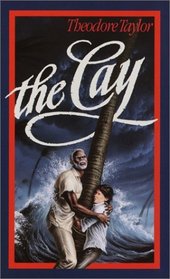Helpful Score: 2
First Line: Like silent, hungry sharks that swim in the darkness of the sea, the German submarines arrived in the middle of the night.
It is 1942. Phillip Enright is eleven years old. He and his mother moved to the island of Curaçao off the coast of Venezuela when his father got a job with the Royal Dutch Shell oil refinery there. Phillip loves island life and thinks the sighting of German submarines is exciting until he sees one of his favorite ships torpedoed and sunk. His mother is homesick for her native Virginia, and the presence of the Germans makes her frantic with worry. Over everyone else's better judgment, she insists on taking Phillip with her back to Virginia.
The worst happens: their ship is attacked and sunk, and young Phillip (now injured and blind) finds himself marooned on a tiny island with an old black man named Timothy. Although Phillip's friends on Curaçao had much more relaxed attitude toward blacks, Phillip can't see, he's scared to death, and he treats Timothy as an American used to segregation would. That is something that old Timothy is not willing to accept.
This is a wonderful story about survival and acceptance with the rock solid character of Timothy at the center of it all. The setting of the tiny island is very well done, as is the use of dialect. This is a book that has a very high ethical purpose, and it succeeds because the author tells a believable, mesmerizing story-- he does not preach a sermon. Theodore Taylor has written other books, and I'd certainly like to sample more.
It is 1942. Phillip Enright is eleven years old. He and his mother moved to the island of Curaçao off the coast of Venezuela when his father got a job with the Royal Dutch Shell oil refinery there. Phillip loves island life and thinks the sighting of German submarines is exciting until he sees one of his favorite ships torpedoed and sunk. His mother is homesick for her native Virginia, and the presence of the Germans makes her frantic with worry. Over everyone else's better judgment, she insists on taking Phillip with her back to Virginia.
The worst happens: their ship is attacked and sunk, and young Phillip (now injured and blind) finds himself marooned on a tiny island with an old black man named Timothy. Although Phillip's friends on Curaçao had much more relaxed attitude toward blacks, Phillip can't see, he's scared to death, and he treats Timothy as an American used to segregation would. That is something that old Timothy is not willing to accept.
This is a wonderful story about survival and acceptance with the rock solid character of Timothy at the center of it all. The setting of the tiny island is very well done, as is the use of dialect. This is a book that has a very high ethical purpose, and it succeeds because the author tells a believable, mesmerizing story-- he does not preach a sermon. Theodore Taylor has written other books, and I'd certainly like to sample more.




